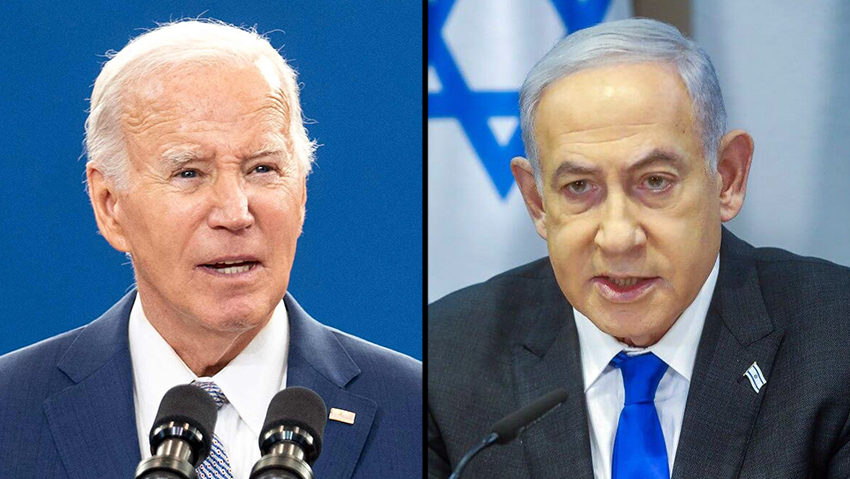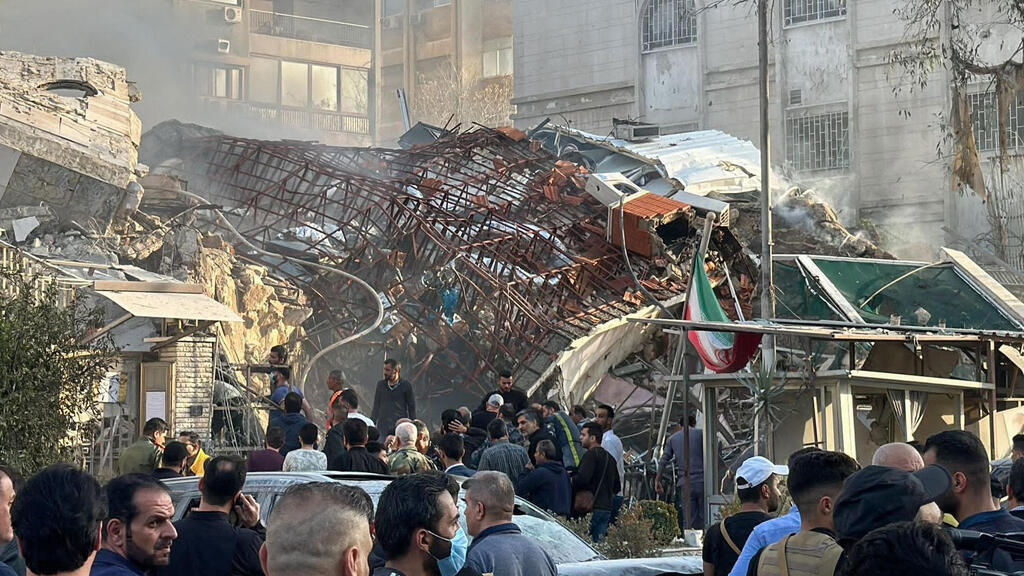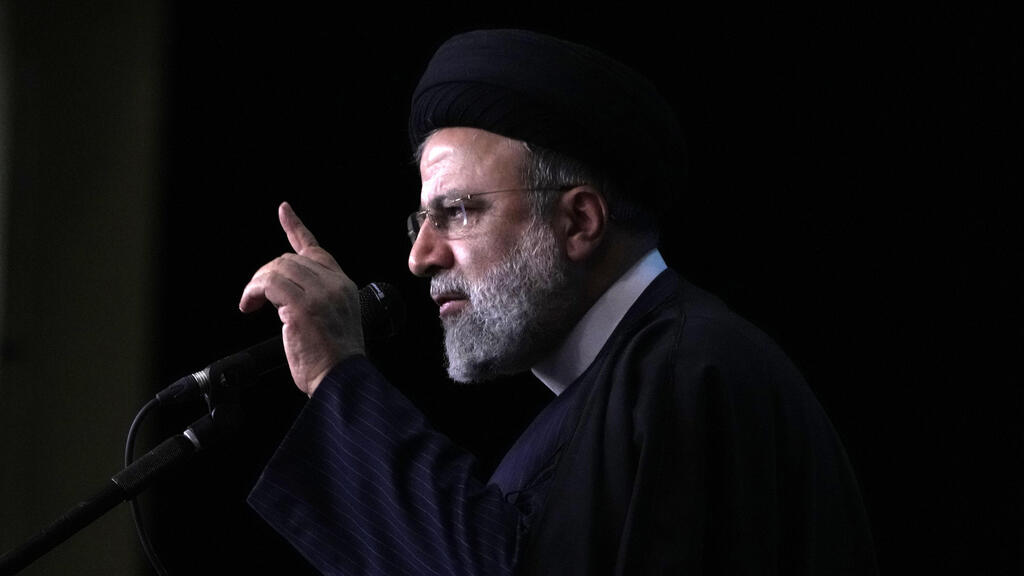Getting your Trinity Audio player ready...
The United States told Iran it played no part and had no advance knowledge of Monday’s airstrike on the Iranian-operated facility in Damascus, Syria which resulted in the killings of top Iranian Revolutionary Guard Corps (IRGC) personnel, CNN reported in the wake of the attack on April 1.
Rear Adm. (ret.) John Kirby, the U.S. National Security Council spokesperson, stated in his news briefing on April 2, that the U.S. “had no indication Israel was responsible for the attack.” However other administration officials made sure Israel was implicated. For example, NBC News cited “two U.S. officials“ as revealing that the Biden administration informed Tehran “directly” that it was not involved “in any way” in the Damascus airstrike. The US also said it did not know about the attack ahead of time, and was “only informed when the planes were on their way to their destination.” Washington did not know who the target was either.
3 View gallery


US President Joe Biden and Prime Minister Benjamin Netanyahu
(Photos: Miriam Alster, Eros Hoagland / GETTY IMAGES NORTH AMERICA / AF)
"We were not notified by the Israelis about their strike or the intended target of their strike in Damascus," Pentagon spokesperson Sabrina Singh said.
The mostly unofficial practice of the U.S. dissociating itself from Israel’s action is not new, of course. It was especially pronounced during President Barack Obama’s tenure but also during that of his successor Donald Trump. For example, Israel was suspected of, yet never claimed responsibility for, a July 19, 2019, attack north of Baghdad on a base manned by the IRGC that reportedly was used to transfer weapons to Syria. Accordingly, the strike destroyed guided missiles with a range of 200 kilometers.
On August 22, the New York Times cited “two senior American officials” as saying that Israel had carried out several strikes in recent days on munitions storehouses for Iranian-backed groups in Iraq.
In pointing a finger at Israel as the sole culprit for these attacks, Washington’s overriding interest was and continues to be the shielding of its regional military and other interests from possible retaliation either by Iran itself or by one of its proxies. Therefore, after the July 2019 strike, a senior American official was quoted in the New York Times on August 22, 2019 as saying that “Israel was pushing the limits with the strikes in Iraq. Speaking on condition of anonymity to discuss delicate diplomatic matters, the official said the airstrikes could get the United States military removed from Iraq.”
Recall, for example, that on January 8, 2020, in a military attack codenamed Operation Martyr Soleimani, the IRGC launched over 12 ballistic missiles at two sites where U.S. military personnel was based – the al-Assad Airbase in Al Anbar Governorate, western Iraq, as well as another airbase in Erbil – as response to the assassination of Major General Qasem Soleimani, the commander of its Quds Force, in a U.S. drone attack.
Moreover, starting on October 17, 2023, and in response to U.S. support for Israel in its war against Hamas, Iran-backed militias initiated a coordinated series of more than 170 attacks on U.S. military bases and assets in Syria, Iraq and Jordan. These attacks resulted in the deaths of three American soldiers and injuries to dozens of others. In February 2024, following U.S. air strikes in Syria and Iraq, as well as secret talks between the U.S. and Iran held in Oman the previous month, militia attacks against U.S. forces were halted.
Biden is strongly interested in maintaining the “peace” with the mullahs and, by exposing Israel as responsible for the attack in Damascus, is signaling that the U.S. is still abiding by the understandings reached with Tehran. The president must have been unnerved to hear Iran’s Foreign Minister Hossein Amir-Abdollahian widely hold the U.S. responsible for the strike when he charged that “the United States should be answerable.” Iran’s Foreign Ministry in fact summoned the Swiss chargé d’affaires in Tehran the day after the attack to “discuss the incident,” since Switzerland represents U.S. interests in Iran.
Of course political considerations are also at work. Demonstrating the existence of daylight between the U.S. and Israel is certainly in Biden’s political interest. After all, Biden is courting the “progressive” wing of the Democratic Party as well as Arab/Muslim voters in key states for the upcoming presidential election, both of which want America to throw Israel under the bus, if not switch its allegiance altogether.
Exposing Israel to possible retaliation is also meant as a sign of Washington’s irritation at being continuously surprised by Jerusalem which, as noted, it fears could put America's presence in the region and its interests in jeopardy.
But there are also strategic implications, ones which the U.S. may or may not have intended.
By pointing to Jerusalem as responsible for the attacks, Washington has inadvertently increased the likelihood of Iran retaliating en masse against Israel as the U.S., in effect, is signaling that the incident in Damascus is exclusively an Israeli-Iranian issue. Had the U.S. kept silent, the mullahs would have to consider that Israel’s action had, at least, the tacit nod of Washington and that a retaliatory attack on Israel, especially a sizable one, could bring the Americans in.
Indeed, interpreting American silence as an implicit approval for Israel's Damascus strike would likely cause Tehran to go a step further and ponder whether Washington’s acquiescence extends beyond a tacit consent. For example, did the U.S. provide Israel with updated intelligence information? Did it use its ample electronic capabilities in the theater to “blind” Syrian and/or Russian radars which are densely deployed across the country? Given the practice of the U.S. blaming Israel in the previous instances, such Iranian suspicions would likely mount if Washington suddenly fell silent.
The net result would be to enhance Israeli deterrence vis a vis Iran, or at least make the mullahs limit the scope of their retaliatory action.
Mention must be made of another possible interpretation, one most likely unintended by Washington. By pointing at Israel as the sole culprit, Washington is tacitly confirming it has no control over Israel's actions. Given the audacity of the attack and its unmistakable direct challenge to Tehran, the implication is that Israeli Prime Minister Benjamin Netanyahu has indeed gone berserk.
Unintentionally and paradoxically, perhaps, such a signal by the U.S. administration would likely boost Israel’s standing in the region and its deterrent posture. The mullahs could not count on the U.S. restraining Israel if the latter judges the Iranian punishment to be “excessive” or "disproportionate.” The region could witness an all-out explosion which the mullahs and Biden would dearly like to avoid.
- Dr. Avigdor Haselkorn is a strategic analyst and the author of books, articles and op-eds on national security issues.



